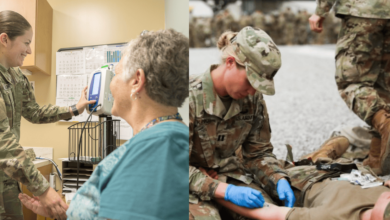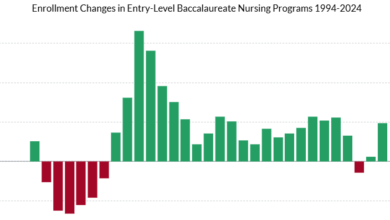NHS must stop ‘throwaway’ culture, says senior nurse

A senior nurse has called a major reduction in single-use items in critical care and other areas of hospitals to reduce clinical waste in the NHS.
Health leaders and policymakers came together today to discuss the “next steps” for the NHS’ net zero targets and how to improve sustainability in British healthcare.
“We [must] move away from this ridiculous throwaway society”
Clare Nash
Hosted by the Westminster Health Forum and chaired by Conservative MP and former emergency medic Dr Kieran Mullan, the event heard from various NHS leaders and other people involved with health sustainability improvement.
A key focus of the forum’s event was waste reduction.
Clare Nash, a registered nurse with a background in critical care and head of clinical products management at Black Country Alliance, spoke about the scale of single-use clinical waste across the NHS.
In particular, she pointed to the environmental impact of single-use needles, gowns and other personal protective equipment (PPE), couch roll and critical care items such as tourniquets.
As well as production emissions, Ms Nash said, these single-use items going to landfill have a huge environmental impact in the form of using up materials which could run out in the next century.
“There’s one planet, and 40% of the elements that make everything are at serious threat, so we’ve got to stop throwing things in the bin, we’ve got to look at how we move back to reusables like we did when I was a baby nurse,” she said.

Clare Nash
She called for the NHS to move towards a “circular” economy of recycling and reusing materials where appropriate.
“In the manufacturing and raw material extraction is where most of the carbon sits, and we throw it away,” she added.
“If we can keep that in circulation, we’re keeping the elements from being sent off to landfill or been incinerated, but also keeping those elements in circulation, which has got to be the right thing to do.”
Ms Nash said Sandwell and West Birmingham NHS Trust, where she is based, had begun trialling the use of reusable PPE such as gowns during the Covid-19 pandemic and, since then, reusable tourniquets in critical care.
She explained that these measures had more than just an environmental impact: “We’re not just talking about products, we’re talking about the supply chain as well.
“Single-use instruments are made predominantly in Pakistan, where children as young as eight are making things that we’re using once and throwing away, it’s just not right.
“They’re getting injured, making these things for us that are used once.”
The nurse advocated for the trials at her trust, and others, for reusable equipment to be widened and for the viability of more reusable products to be investigated.
She said that, in the West Midlands alone, more than 750,000 couch rolls were used per year and that this was the next item her trust was looking at replacing or ceasing the use of.
“So let’s look again at how we deliver care and what things we can challenge – what things we don’t need at all,” Ms Nash added.
“We [must] move away from this ridiculous throwaway society, both at home and in the NHS in the care that we deliver.”
Pete Waddingham, net zero lead for the Health Innovation Network, presented to the forum some examples of recent innovations he had seen for reducing clinical waste in the NHS.

Pete Waddingham
These included inhaler cases made out of organic matter including seaweed, sharps bins made out of waste wood, and medical-grade disinfectant stored in paper-soluble packets.
All of these, Mr Waddingham said, would help move the health service towards a more circular economy.
He also pointed to a new product, being evaluated by some English NHS organisations, which could stop vaccines and other medicines being spoiled when a power outage happens.
Mr Waddingham explained: “This product keeps fridges cold for four hours if the power goes off, it kicks in a bit like an ice pack.
“It’s a useful concept and if we think about climate change, unfortunately we are going to get a lot of disruption to our energy infrastructure – whether heat or other geopolitical issues, this prevents that waste [of] medicines and those having to go to the clinical waste bin.”
Emma Clyne, principal category manager for estates and facilities at the NHS Shared Business Service, advocated further for reducing waste on a cost-saving front for trusts.
She, alongside Mr Waddingham, said there would be a move in the near future for on-site waste disposal and energy generation at health facilities in the UK.
Also speaking at the event was Nick Markham, parliamentary under secretary of state for the Department of Health and Social Care (DHSC) and member of the House of Lords.
Lord Markham updated attendees about net zero targets for the NHS and government. He said the health service had a “critical role” in the ambitions of the UK as a “clean energy superpower”.
The DHSC representative said the fact some NHS sites still used oil for heating, and only recently removed coal fired boilers at others, was “sobering”, but promised the government would continue to back measures to address the health service’s carbon footprint.
“The NHS has a total impact on carbon emissions equivalent to that of Croatia,” said Lord Markham.
“Clearly this is a major challenge, [but the] NHS has already done an incredible job of rising to this challenge.”
He said DHSC investment in LED lighting in hospitals, to save on energy bills, would go towards this.
So too, Lord Markham said, would the New Hospitals Programme.
He pointed in particular to the modular ‘Hospital 2.0’ builds – in which hospitals are built with prefabricated ‘modules’ – which he said would bring the carbon footprint down as well as reduce the build time from 11.5 to six years.
“We all have a shared interest in ensuring the NHS is sustainable, and able to get on delivering care in a way that will make current and future generations proud,” he added.
“I hope my comments today show that we’ve already taken great strides towards the right investment and the right collaboration. I’ve no doubt that we will continue to do so as we move forward towards that 2040 [net zero] target.”






